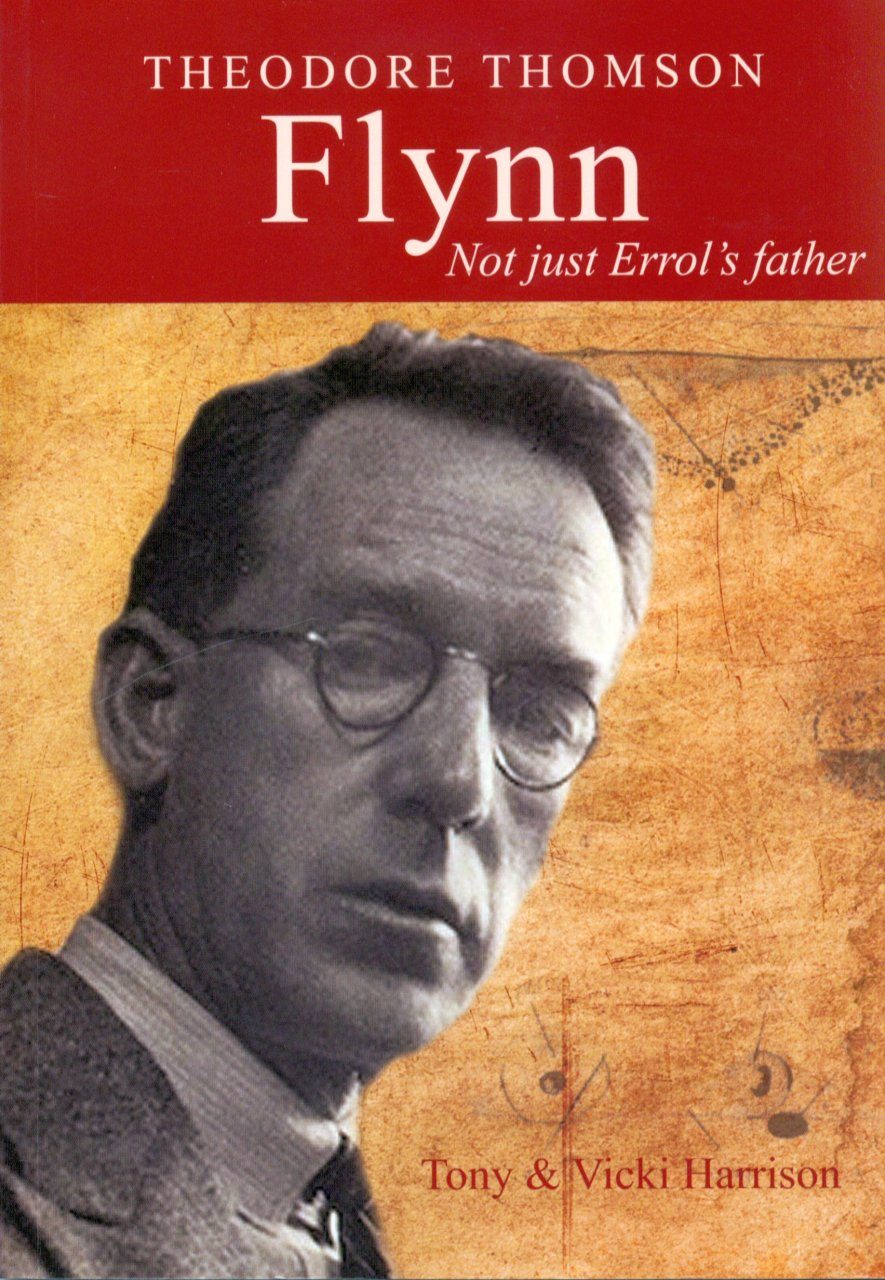Do you all know about the book about TT Flynn it is a great read. It tells you a lot about TT walking home not in a straight line and how he was very close with a fair few ladies around Hobart. I wonder where his son got it from. The only thing was Errol was very mischievous to go with it.Love Genene.
— tassie devil

Thank you very much, Genene. Is it the book by Tony and Vicki Harrison you are referring to? Among other praise, it received the following highly complimentary review in the Historical Records of Australian Science. It’s no wonder why Errol held his father in such high regard. He was an extraordinary man and no doubt a powerful influence on Errol.
:
Theodore Thomson Flynn: Not Just Errol’s Father
.Artemis: Hobart,2013. 238 pp., ISBN: 978-0-646-59478-1,AUD $35.00.
Scientific biographies are, as Erwin Chargaff once claimed, a ‘most awkward literary genre’. All too often, it is the science that is exciting and interesting, rather than the scientists themselves. Arguably, the life of scientists—the personal and particular—offers relatively little insight into the ideas and developments for which they are famous. Science is, after all, a collaborative enterprise, a community of knowledge, rather than an expression of individuality. If Darwin had not formulated the theory of evolution by natural selection, Wallace would have.
Scientific discoveries grow within a shared milieu, and while some participants might be blessed with having birthed a particularly ingenious, insightful or innovative idea, their creations cannot be said to be the product of a singular individual life in the same way that the work of an artist might be said to be unique.This is not to say, as many have, that the personal lives of scientists are boring. On the contrary, closer inspection often reveals scientific lives every bit as passionate, irrational and troubled as that of any artist or celebrity. But the relationship between scientists’ lives and their intellectual achievements is often more difficult to reconcile.Tony and Vicki Harrison’s biography of Theodore Thomson Flynn provides an excellent illustration this dilemma.
As the founding Chair of Biology at the University of Tasmania, Flynn provides a fascinating case study of the early development of the biological sciences in Australia. His diverse range of research interests, from the reproductive biology of marsupials to marine fauna of southern oceans, attests to the flexibility and breadth that researchers often demonstrate in nascent disciplines. The difficulties Flynn faced balancing his research interests with his teaching responsibilities will be all too sadly familiar to modern academics, as will the dubious behaviour of university administrators exploiting generous research bequests. The risks faced by successful researchers on ‘soft money’ were also amply illustrated by Flynn who,after twenty-one years of service at the University of Tasmania, summarily found himself an unemployed professor.
Like many researchers who consider themselves undervalued in their home countries, Flynn’s skills and credentials were better recognised by overseas institutions. He secured the position of Professor of Zoology at Queen’s University, Belfast, which he held 1931–1948. The appointment of an Australian born and trained scientist to the senior post of a prestigious European university seems at odds with the common perception that Australian universities and departments, at least in their early development, were often dominated by British-trained staff. Perhaps even more unexpected was the fact that Flynn emerged from a working-class country family with no history of university education. And yet, the Harrisons’ biography suggests that this was not as uncommon as we might think.
Flynn’s pioneering work continues to be well cited in the relevant scientific literature today, suggesting that scientists have retained a place for him in their own ongoing, and constantly evolving intellectual histories. But the attraction of Flynn as a subject for biography is not just his science, but also his personal life, most notably as the father of the famous Tasmanian movie star, Errol Flynn. Notwithstanding the close bond between father and son it is difficult to see that much light is shed by Theodore on his son’s remarkable life, nor by the famous son on his father’s professional achievements.
There are many elements of Theodore’s life that are, perhaps, noteworthy—from his fractured childhood family liife and his own unconventional marriage, to his challenging attitudes to administration and impressive response to wartime efforts in the Belfast Blitz. But he remains a somewhat elusive figure for much of the Harrisons’ biography, often swamped by a vast cast of surrounding characters. Given the disjunction between the personal and the professional, perhaps it is notsurprising that it is only in retirement, largely spent managing his son’s estate in Jamaica, that Theodore Thomson Flynn seems to emerge in his own right.
Amassing a vast array of disparate information around a person must always be challenging for biographers. A careful chronological structure may often be their friend, but not one always used to best effect in this case. Despite this limitation, historians of science, and perhaps film, will find much to intrigue them in this meticulously researched biography.
[img [/img]
[/img]
A most EXCELLENT look into a most significant academic career of TT.
It does, indeed, matter who SPEARHEADS a change of perception into a particuliar area of inquiry, and TT certainly sounds like a stand alone in his areas of interest.
As time passes his ontributions may, indeed be MORE appreciated.
Similarly, since the subject of Wallace v Darwin is highlighted in this essay/review, an interesting “parallel” may well, in the future, apply:
From Wicki:
“Others have noted that another difference was that Wallace appeared to have envisioned natural selection as a kind of feedback mechanism keeping species and varieties adapted to their environment.[93] They point to a largely overlooked passage of Wallace’s famous 1858 paper:
The action of this principle is exactly like that of the centrifugal governor of the steam engine, which checks and corrects any irregularities almost before they become evident; and in like manner no unbalanced deficiency in the animal kingdom can ever reach any conspicuous magnitude, because it would make itself felt at the very first step, by rendering existence difficult and extinction almost sure soon to follow.
The cybernetician and anthropologist Gregory Bateson would observe in the 1970s that, though writing it only as an example, Wallace had “probably said the most powerful thing that’d been said in the 19th Century”. Bateson revisited the topic in his 1979 book Mind and Nature: A Necessary Unity, and other scholars have continued to explore the connection between natural selection and systems theory.”
Quite erudite, Sir Karl. It’s wonderful that Errol legacy has evolved to help keep his Dad’s very cool and pioneering work from being forgotten. Wallace, also, should never be forgotten. Here’s something that could be called On the Origin of On the Origin of Species:
www.npr.org…
[img]http://www.theerrolflynnblog.com/wordpress/wp-content/uploads/2017/06/9f8f27cc93eac0a0c7bb56366844eadc.jpg[/img]
Likewise, GT, in your own Errol-dition… and rounding out the picture on this other unsung and almost forgotten contributor embodying both grace and graciousness in this survival of the fittest (aka: the competitive world of science) environment.
And now, speaking of Flynn the younger, he and Mr. Wallace had something of a more “personal” nature in common in that they both suffered from malaria.
“(Wallace)… recovering from a bout of malaria on the remote Indonesian island of Halmahera, the young British biologist came up with an idea that would transform humanity’s view of itself: he worked out the theory of natural selection.”
In Errol’s case, the illness, contracted in 1928, may well have heightened his desire to both read and adventure, and ultimately driving him from the jungle. He summarized this time and his own thinking in this excerpt from his New Guinea diary of 1933:
“I went to the woods because I wished to live deliberately, to front only the essential facts of life, and see if I could not learn what it had to teach, and not, when I came to die, discover that I had not lived. I did not wish to live what was not life, living is so dear; nor did I wish to practise resignation, unless it was quite necessary. I wanted to live deep and suck out all the marrow of life, to live so sturdily and Spartan- like as to put to rout all that was not life, to cut a broad swath and shave close, to drive life into a corner, and reduce it to its lowest terms, and, if it proved to be mean, why then to get the whole and genuine meanness of it, and publish its meanness to the world; or if it were sublime, to know it by experience, and be able to give a true account of it in my next excursion. For most men, it appears to me, are in a strange uncertainty about it, whether it is of the devil or of God, and have somewhat hastily concluded that it is the chief end of man here to “glorify God and enjoy him forever.”
The above statement is surely reflective of quite the “evolution” in his thinking and world view. And, of course, we know the rest of what followed…
I must amend the previous post. The 1933 quote I attribute to Flynn was actually from Henry David Thoreau’s Walden.
The real Flynn quote from his New Guinea appears below.
In my haste to get out the door this morning, I grabbed (cut and pasted) the wrong quote.
And the reason they were “side by side”, so to speak, in my notes, was because it was Flynn who lifted some phrasing in his piece from Thoreau, and was so “noted by Robert Woodward” (see pg. 96, Inherited Risk by Jeffrey Meyers).
Mea culpa!
And here now…
“I am going to China because I wished to live deliberately. New Guinea offers me, it is true, satisfaction for the tastes I have acquired which only leisure can satisfy. I am leaving economic security and I am leaving it deliberately. By going off to China with a pawltry few pounds and no knowledge of what life has in store for me there. I believe that I am going to front the essentials of life to see if I can learn what it has to teach and above all not to discover that when I come to die, that I have not lived.
We fritter our lives away in detail but I am not going to do this. I am going to live deeply, to acknowledge not one of the so-called forces which hold our lives in thrall and reduce us to economic dependency. The best part of life is spent in earning money in order to enjoy a questionable liberty during the least valuable part of it. To hell with money! Pursuit of it is not going to mold my life for me. I am going to live sturdily and Spartan-like up, to drive the life into a corner and reduce it to its lowest terms and if I find it sublime I shall know it by experience- and not make wistful conjectures about it conjured up by illustrated magazines. I refuse to accept the ideology of a business world which believes that a man at hard labor is the noblest work of God. Leisure to lose as I see fit!”